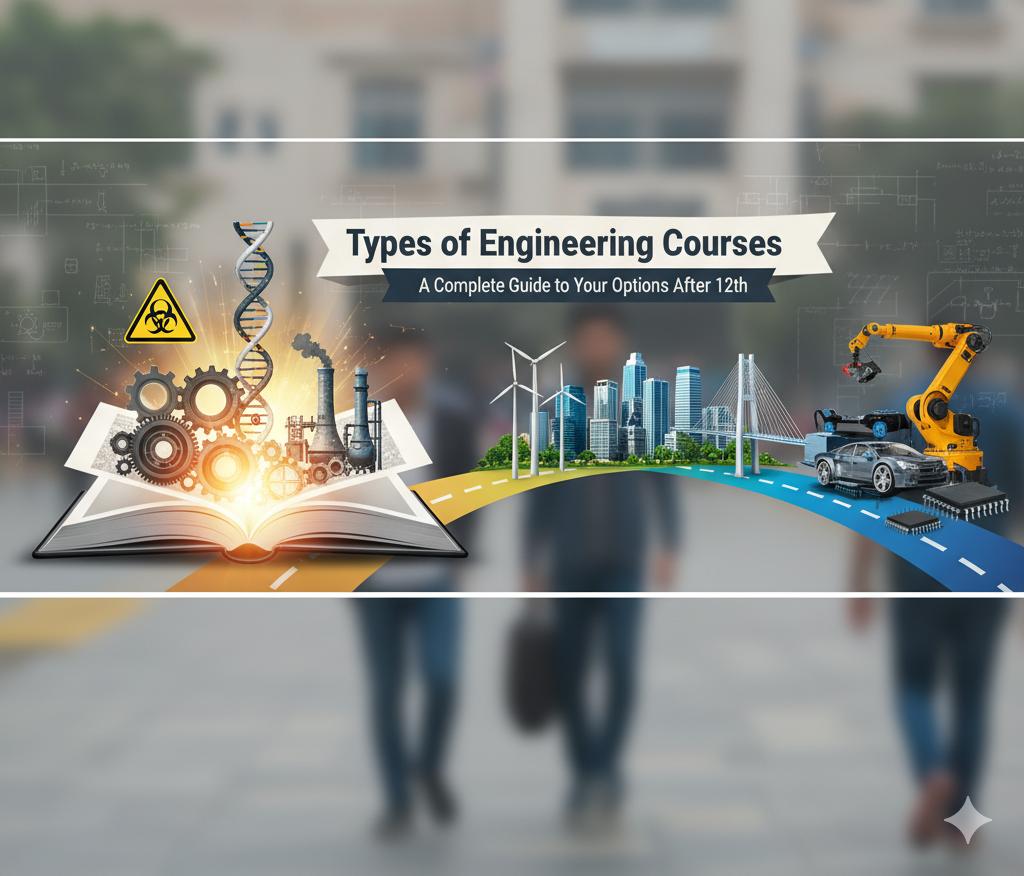
Engineering courses after 12th are one of the most popular choices among Indian students. Every year, thousands of Indian students consider studying engineering after their 12th grade. But with so many options available, students often find it difficult to choose the right engineering stream. The options are many — from core fields that have stayed relevant for years to newer, cutting-edge ones.
This guide seeks to streamline the process a bit by dissecting the leading engineering branches, both classic and contemporary, leaving you with all the details you need to make a well-informed and confident decision. Perhaps you are looking for various B.Tech courses after 12th or comparing various engineering branches, then this article would be helpful to you in mapping your search and reaching your destination for engineering career paths.
What are the Core Branches of Engineering?
Listed below are all the core branches of engineering which the 12th pass students can take a look at.
- Mechanical Engineering (ME): Mechanical Engineering, known as the “mother of all engineering disciplines”, focuses on the design, analysis, and manufacture of machines and mechanical systems. The topics include thermodynamics, materials science, fluid mechanics, and machine design. Some potential career opportunities are Automotive Engineer, HVAC Design Engineer or Robotics Engineer.
- Civil Engineering (CE): The design, construction, and maintenance of structures and infrastructure (roads, bridges, buildings) is a task best suited for Civil engineers. Its subjects range from structural analysis to environmental studies and urban planning. Graduates can pursue careers as Structural Engineers, Urban Planners, or Project Managers.
- Electrical Engineering: Electrical Engineering is based on the application of electronics, electricity, and electromagnetism. They take classes in power systems, control systems, signal processing, and telecommunications. Careers range from Power Systems Engineer to Control Engineer and Telecommunications Specialist.
- Computer Science Engineering: It is the backbone of the digital world. It includes software development, artificial intelligence, data science, and computer networks. Some engineering career options in this field are Software Developer, Data Scientist, and Cybersecurity Analyst.
- Electronics & Communication Engineering: It deals with the construction, design and manufacturing of electronic circuits, embedded systems and modern communication technology. Areas such as wireless, VLSI, and signals dominate the curriculum. Graduates will be able to work as Embedded Systems Engineers, Network Engineers, VLSI Design Engineers, etc.
- Agriculture Engineering (AR): Agricultural Engineering stands for a four-year undergraduate course in agricultural studies and processes. The fact that agricultural engineers apply their wide education background in engineering technology and biological science is evident in their designs for agricultural machinery, equipment, and structures. They also work to prevent soil erosion and conserve water and enhance the processing of existing agricultural curricula.
These are the B.Tech courses after 12th, which are widely opted for by students and set up a strong base for many fields.
Emerging and Specialised Engineering Fields
Engineering is no longer only about the conventional branches. With the continued advancement of technology, several new fields of engineering have gained popularity:
- Aerospace Engineering: Centres on crafting aircraft and spacecraft systems, including aerodynamics, propulsion, and avionics.
- Biomedical Engineering: Combines engineering with medicine and biology to develop life-saving devices and health care technologies.
- Mechatronics Engineering: Combines mechanical, electrical, and computer engineering to design robotics and intelligent manufacturing systems.
- Robotics Engineering: Specialises in building and programming robots, drawing from AI, mechanical design, and control systems.
Students opting for these engineering courses after 12th often gain a competitive edge by entering industries that are future-oriented and globally relevant.
Entrance Exams and Eligibility Criteria for Engineering
To pursue engineering courses after completing 12th grade, students must meet specific eligibility criteria and, in most cases, pass entrance examinations. Here’s a breakdown:
-
Basic Eligibility Criteria
- 10+2 (or equivalent) pass with Physics, Chemistry, and Mathematics as mandatory subjects.
- A minimum aggregate score of 50–60% (varies by institution).
- Some colleges may also require English as a mandatory subject.
-
National-Level Entrance Exams
- JEE Main is one of the most popular examinations for admission to NITs, IIITs, and other centrally funded technical institutions, conducted by the NTA.
- JEE Advanced: For admission to the IITs, only students who qualify in JEE Main can appear.
- BITSAT: Exam for admission to BITS Pilani and its campuses.
- VITEEE: Held by VIT University for its engineering courses.
-
State-Level Entrance Exams
- MHT CET (for Maharashtra), WBJEE (for West Bengal), KCET (for Karnataka), AP EAMCET (for Andhra Pradesh), etc., are exams for state universities and their affiliated colleges.
-
University-Specific Exams
- Admission to JU Jaipur is based on merit in the qualifying examination or the entrance test conducted by the University.
- SRMJEEE (SRM Institute) and KIITEE (KIIT University) are examples of other private university entrance tests.
Direct Admission Options
Many private colleges also offer direct admission based on Class 12 marks, especially under the management quota, but competitive exams are the popular choice for gaining admission to top colleges.
How Employability is Enhanced in Top Engineering Courses?
Success in engineering doesn’t depend only on classroom knowledge. It also comes from building the right skills and showcasing your abilities through projects. Here are some areas to focus on:
- Technical Skills: Master the software and tools for your branch (AutoCAD and SolidWorks for Mechanical, MATLAB for Electrical, Python and Java for Computer Science).
- Hands-on Projects: Solve real-world projects such as building a mobile app, designing a solar-powered device, or creating a structural model. These demonstrate your practical abilities.
- Research & Innovation: Take part in paper presentations, coding competitions, and engineering expos. These add credibility to your profile.
- Industry Exposure: Internships, apprenticeships, and hackathons are excellent ways to apply theory in practice and stand out in interviews.
- Soft Skills: In addition to technical skills, leadership, communication, and problem-solving are necessary.
Job Opportunities and Salary Expectations After Completing Engineering Studies
Various types of Engineering branches have different career scopes and salary structures:
- Mechanical & Civil Engineering: Core industries, such as construction, automotive, and infrastructure, always require talented individuals. Entry-level salaries may start modestly, but with experience and specialisation, growth is steady and rewarding.
- Electrical & Electronics Engineering: Demand is growing as renewable energy and innovative systems continue to expand. There are competitive salaries, especially in areas like power, automation, and communications.
- Computer Science Engineering: One of the most in-demand fields globally, offering roles in software development, AI, data science, and cybersecurity. Salaries are generally among the highest in the engineering sector.
- Emerging Specialisations (Robotics, Aerospace, Biomedical, Mechatronics): These fields are rapidly expanding due to technological advancement. While starting opportunities may be niche, long-term growth and global career prospects are excellent.
On a larger scale, newer B.Tech courses after 12th from emerging fields can lead to high salaries, but core courses provide stability and a mix of options for engineering career paths.
Key Factors to Consider Before Choosing an Engineering Course
When you’re choosing the right course, it’s not just a matter of demand in the market. It’s a process of self-discovery to figure out where your true interests and abilities lie. Choosing wisely at this stage can save you from future confusion and ensure long-term satisfaction.
- Passion: Your inclination should be the primary criterion for choosing a stream. If you genuinely enjoy solving mechanical puzzles, programming, or electrical circuits, then you will likely remain engaged and interested throughout your entire education and career.
- Aptitude: Most branches of engineering require a solid foundation in math, followed by the application of concepts in science. Analytical thinking, logical reasoning, and problem-solving skills will help you not only during the course but also in building successful engineering career paths later.
- Future Scope: Every branch of engineering comes with its own market demand and growth opportunities. Explore industry trends, technical developments, and the future of engineering so that you can make the right career choice to remain relevant and ahead of the game.
- Curriculum: Learn beyond simply the course name – what are the actual syllabi, electives, and research options available at different colleges? It will help you understand how practical exposure and learning are in the field you have opted for.
Skills Required to Succeed in Engineering Jobs
Succeeding in engineering isn’t just about what you’ve learnt in the classroom or how well you passed exams. It’s about developing a solid set of transferable skills that employers want.
- Problem Solving: Engineers are trained to deal with complex, real-world problems. The ability to break down problems and create innovative solutions is highly valued across industries.
- Communication: No matter how proficient you are in technical skills, you must be able to effectively convey ideas and solutions to your peers, manager, and even non-technical stakeholders. Strong communication often sets great engineers apart.
- Teamwork: Most engineering projects are collaborative efforts. Learning how to work in teams, share responsibilities, and respect diverse viewpoints will prepare you for industry dynamics.
- Practical Experience: Internships, hackathons, and live projects enable you to apply classroom learning to real-life scenarios. This practical experience means you will be well-prepared for the job and will have a competitive edge over others when applying for top positions after pursuing B.Tech courses following 12th grade.
These competencies, when paired with technical knowledge, can differentiate candidates in a crowded job market and support career longevity.
Conclusion
Choosing the right path among the many engineering courses after 12th is both exciting and challenging. From Mechanical and Civil Engineering to cutting-edge fields like Robotics and Biomedical, each branch opens doors to unique possibilities. Your decision must always be based on what you are already good at, what you love doing, and where you see your career in the long term.
Remember, engineering is more than a degree; it is a passport to solving the world’s biggest challenges and making the innovations that will shape the future. Take time to research, connect with professionals, and explore the wide range of engineering specialisations available today. The choice you make now can define your journey and the role you play in creating tomorrow’s world.
FAQs


